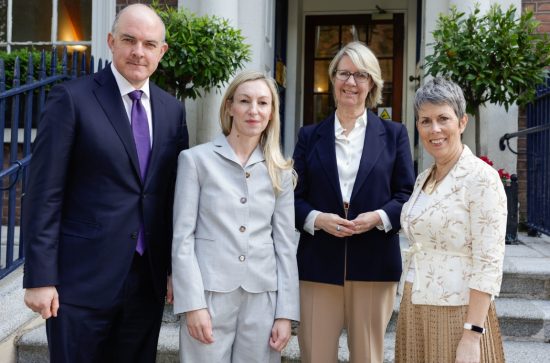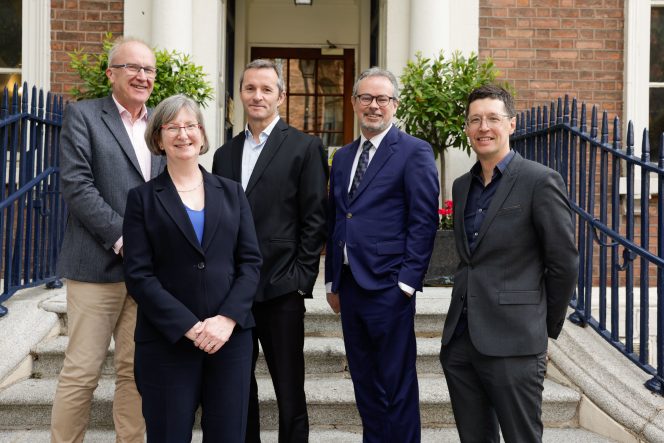
The Irish Research e-Library (IReL) celebrated 20 years of strengthening Irish research infrastructure at an event hosted at the Royal Irish Academy in Dublin by its chairperson, President of Maynooth University Professor Eeva Leinonen.
IReL, a consortium of Irish research libraries providing access to licensed e-resources, open access publishing agreements, and open science infrastructure, brought together librarians, academics, and policymakers to reflect on IReL’s impact on the Irish research and education landscape and discuss its future role in enhancing Irish research and supporting educational excellence.
A significant accomplishment celebrated during the event was Ireland's leadership in supporting open access to Irish research publications. Thanks to IReL’s negotiation of and support for transformative agreements, Ireland now ranks as a global leader in open access, placing sixth among benchmarked countries alongside renowned innovators like Finland, Sweden, Norway, the Netherlands, and the UK.
Reflecting on IReL’s significance, Prof Leinonen noted that Maynooth University has been proud to host IReL since 2016, emphasising the collaborative spirit of IReL and its role in fostering equity and trust among researchers and institutions. She highlighted that the collective wisdom and resources of librarians have created a shared service that supports a cycle of research impact benefiting all and extended special thanks to Cathal McCauley, University Librarian at Maynooth, for his pivotal leadership during a period of transition and growth for IReL.
Dr Colm O'Reardon, Secretary General of the Department of Further and Higher Education, Research, Innovation and Science, emphasised IReL's role in strengthening the Irish higher education system. He highlighted how IReL contributes to evidence-based decision-making and described libraries as opportunities for growth and innovation, noting that they “feel like opportunity” and reflect the positive impact IReL has had.
Dr Orla Flynn, President of Atlantic Technological University, discussed the importance of IReL's expanded membership, which now includes Technological Universities, Institutes of Technology, Mary Immaculate College, and Dublin Institute of Advanced Studies (DIAS). She noted that some of these institutions have only had 25% access to IReL resources through funding from the Higher Education Authority and N-TUTORR over the past two years. Dr Flynn emphasized the need for a long-term funding model to support full access, stressing that this inclusion is vital for democratising access to research publications and ensuring all researchers have the necessary resources to enhance research activity and industry engagement.
Susan Reilly, Director of IReL, reflected on the foresight of IReL’s early advocates. She noted that since its inception in 2004, IReL has become indispensable for Irish research, providing shared access to online resources that enhance research excellence, collaboration, and researcher mobility. She highlighted IReL’s role in moving Irish research to open access, increasing its societal impact. Reilly also emphasised the evolving nature of access with AI advancements and stressed that equity and trust in information remain critical principles.
The event also featured the announcement of a new IReL Advisory Committee, chaired by Dr Brendan Jennings, Vice President for Research and Innovation at Technological University Dublin. This committee will guide IReL through future changes, ensuring it continues to meet the evolving needs of Irish research and education. Dr Jennings also chaired a panel discussion focused on the future of IReL, featuring Dr Ciarán Seoighe, Deputy Director General of Science Foundation Ireland; Professor Gianpiero Cavalleri, Professor of Human Genetics at the Royal College of Surgeons in Ireland; Monica Crump, University Librarian at the University of Galway; and Dr Brian Jackson, Head of Postgraduate Studies at South East Technological University.

Key takeaways from the panel discussion included:
- Advancing Open Access: Emphasising the need to push towards 100% Open Access, bridging the current gap, and promoting equitable access to research publications with systemic support and cultural change within the research community
- Leveraging Technology and AI: Highlighting that future advancements in AI present both opportunities and challenges for scholarly communications, and stressing the importance of maintaining trust and quality in the review process while leveraging AI to enhance research practices
- Strengthening Collaboration: Underlining the importance of continued collaboration among libraries, researchers, and policymakers to ensure equitable access to information and support for open research practices
- Supporting Research Excellence: Stressing that IReL’s role in providing access to world-class resources is vital for maintaining and enhancing the quality of Irish research, with strategies for ensuring competitiveness on a global scale
- Future Funding and Policy: Highlighting the necessity of sustainable funding and supportive policies for IReL’s future, with ongoing advocacy and engagement with funding bodies and policymakers essential for continued growth and impact.
To learn more about IReL’s achievements and future plans, please visit IReL’s website.
The new IReL Advisory Committee includes Monica Crump from the University of Galway (Vice-chair), Peter Brown from the Irish Research Council, Arlene Healy from University College Dublin, Ashling Hayes from the University of Limerick, Gianpiero Cavalleri from the Royal College of Surgeons in Ireland, Geraldine Canny from South East Technological University, Jean Rickens from Munster Technological University, and Susan Reilly from IReL (ex officio).
